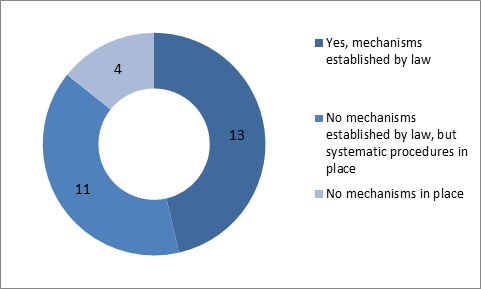Are disabled persons’ organisations consulted and involved in the development of laws and policies?
The involvement of persons with disabilities and their representative organisations in the decision-making which affects them lies at the heart of the CRPD, reflecting the slogan of the disability movement ‘nothing about us without us’. This indicator captures whether there are procedures in place to implement one aspect of Article 4 (3), specifically whether disabled persons organisations (DPOs) are involved in the development of laws and policies which concern them. The data focuses on the involvement of DPOs at the national level. Such consultation is important at all levels of governance, however, including regional, local and municipal administrations, as it is frequently at the local level that key decisions affecting the lives of persons with disabilities are made.
Do EU Member States have mechanisms in place to ensure consultation and involvement of DPOs in the development of laws and policies which affect them?

Source: FRA, 2014.
The analysis indicates that in nearly half (13) of EU Member States, DPOs’ involvement in the development of laws and policies is provided for by law. This involvement takes several different forms. In Sweden, the consultation of DPOs in the development of law and policy is stipulated by the constitution. In Austria, Cyprus, Malta and Spain it is provided for in relevant disability-focused legislation. Article 9 of the Austrian Disabled Persons Act, for example, establishes a Federal Disability Board which includes seven representatives of “organised disabled persons and organised war invalids”. This body is consulted during the process of drafting laws and policy making. The law on the consultation process between the Government and other Services for issues concerning Persons with Disabilities in Cyprus defines the Confederation of Organisations of the Disabled as the social partner of the state and provides that the government consults with the confederation on decisions that directly or indirectly affect persons with disabilities. The confederation is made up of nine DPOs.
In Germany, Hungary, Italy, Poland and Slovakia the duty to consult with DPOs is provided through general provisions that require concerned parties and/or the public to be consulted in law and policy-making processes. Federal ministries in Germany must consult concerned non-governmental organisations in law-making procedures or processes to develop political strategies. Similarly, Italian law establishes that non-governmental organisations (NGOs) active in the field of protection of the rights of persons with disabilities should be involved in the formulation and implementation of policies with regional consultative bodies and a national consultative assembly coordinated by the Ministry for Social Affairs.
In the remaining 15 EU Member States, the analysis indicates that consultation and involvement of DPOs in the development of laws and policies is not required by law. In 11 of these Member States, Belgium, Bulgaria, Croatia, the Czech Republic, Denmark, Estonia, Finland, Ireland, Latvia, Luxembourg and the United Kingdom, however, established mechanisms to ensure systematic consultation with DPOs are in place. The governments of Belgium, Bulgaria, the Czech Republic, Luxembourg and Latvia have established consultative bodies of people with disabilities which include representatives from DPOs. For example, DPOs are a part of the Government Board for People with Disabilities in the Czech Republic.
Other governments have instituted non-binding guidance for governments regarding involving civil society. For example, the Good Engagement Code of Practice (Hea kaasamise tava) in Estonia establishes that government authorities have to include interest groups who will be affected by a planned law in the drafting process. The planned law is sent to the affected interest groups, who are able to provide their comments.
The remaining group of Member States, Greece, Lithuania, the Netherlands and Romania, have neither legislation establishing mechanisms nor systematic practices for consultation with DPOs in the development of laws and policies. It is important to note that this does not mean that DPOs are not involved in practice.